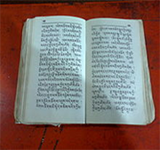
The evidence of the early texts suggests that the Buddha was born in a community that was on the periphery, both geographically and culturally, of the northeastern Indian subcontinent in the 5th century BCE. It was either a small republic, in which case his father was an elected chieftain, or an oligarchy, in which case his father was an oligarch.
According to the Theravada Tipitaka scriptures (from Pali, meaning "three baskets"), the Buddha was born in Lumbini in modern-day Nepal, around the year 563 BCE, and raised in Kapilavastu.

Karma (from Sanskrit: "action, work") in Buddhism is the force that drives sa?sara—the cycle of suffering and rebirth for each being. Good, skillful deeds (Pali: "kusala") and bad, unskillful (Pali: "akusala") actions produce "seeds" in the mind which come to fruition either in this life or in a subsequent rebirth. The avoidance of unwholesome actions and the cultivation of positive actions is called sila (from Sanskrit: "ethical conduct")
Rebirth refers to a process whereby beings go through a succession of lifetimes as one of many possible forms of sentient life, each running from conception to death. Buddhism rejects the concepts of a permanent self or an unchanging, eternal soul, as it is called in Hinduism and Christianity.

Buddhist scholars have produced a remarkable quantity of intellectual theories, philosophies and world view concepts (see, for example, Abhidharma, Buddhist philosophy and Reality in Buddhism). Some schools of Buddhism discourage doctrinal study, and some regard it as essential, but most regard it as having a place, at least for some persons at some stages in Buddhist practice.
Buddhist scholars have produced a remarkable quantity of intellectual theories, philosophies and world view concepts (see, for example, Abhidharma, Buddhist philosophy and Reality in Buddhism). Some schools of Buddhism discourage doctrinal study, and some regard it as essential, but most regard it as having a place, at least for some persons at some stages in Buddhist practice.

Devotion is an important part of the practice of most Buddhists.[66] Devotional practices include bowing, offerings, pilgrimage, and chanting. In Pure Land Buddhism, devotion to the Buddha Amitabha is the main practice. In Nichiren Buddhism, devotion to the Lotus Sutra is the main practice.
Meditation was an aspect of the practice of the yogis in the centuries preceding the Buddha. The Buddha built upon the yogis' concern with introspection and developed their meditative techniques, but rejected their theories of liberation. In Buddhism, mindfulness and clear awareness are to be developed at all times, in pre-Buddhist yogic practices there is no such injunction. A yogi in the Brahmanical tradition is not to practice while defecating, for example, while a Buddhist monastic should do so.
Chitragupta Tours Pvt. Ltd
SH-8/3-A-I-K,
Shivpur Bypass
Behind Lord Budha Public School.
Shivpur, Varanasi-221003, (UP)-INDIA
![]() +91-9936188440, +91-9140245699
+91-9936188440, +91-9140245699
+91-9936188441
![]() info@chitraguptatours.in,
info@chitraguptatours.in,
![]() www.chitraguptatours.in
www.chitraguptatours.in